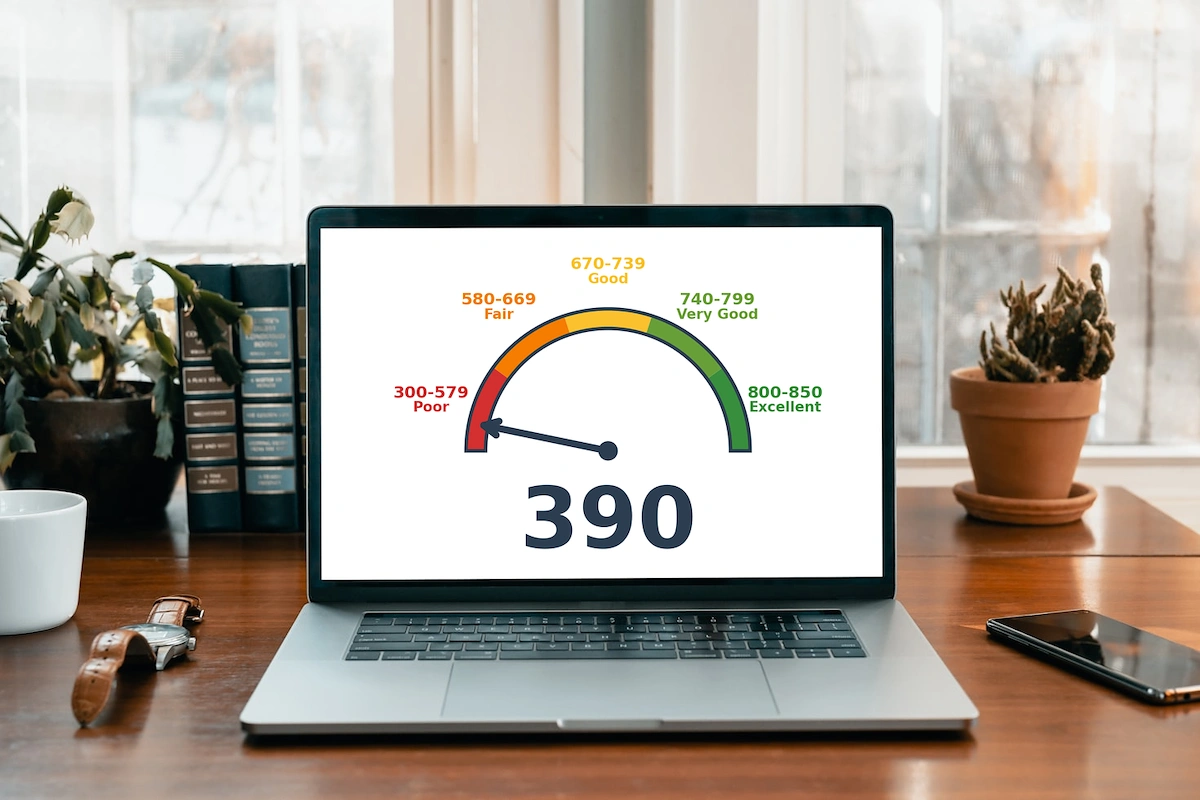
Kudos has partnered with CardRatings and Red Ventures for our coverage of credit card products. Kudos, CardRatings, and Red Ventures may receive a commission from card issuers. Kudos may receive commission from card issuers. Some of the card offers that appear on Kudos are from advertisers and may impact how and where card products appear on the site. Kudos tries to include as many card companies and offers as we are aware of, including offers from issuers that don't pay us, but we may not cover all card companies or all available card offers. You don't have to use our links, but we're grateful when you do!
390 Credit score: What You Need to Know in 2026
July 1, 2025


TL;DR
A 390 credit score offers a clear opportunity to build a stronger financial foundation. It falls within the "Poor" FICO score range, signaling that there are straightforward strategies you can implement to begin improving your creditworthiness.
What Does a 390 Credit Score Mean?
A credit score of 390 is considered very poor. On the widely used FICO Score range of 300 to 850, a 390 falls into the lowest tier. This signals to potential lenders that you represent a significant credit risk, likely due to a history of serious financial difficulties like defaults or collections. It's a number that tells a story of past credit challenges.
With a 390 score, your financial options are severely limited. Securing new credit, such as a loan or credit card, will be exceptionally difficult. Any offers you do receive will likely come with steep interest rates and restrictive terms. This can even affect non-lending decisions, like rental applications. While this presents a major obstacle, it's not an unchangeable situation.
Who Has a 390 Credit Score?
While age isn't a direct factor in calculating your credit score, there is a clear correlation between age and higher scores. Older consumers have simply had more time to build a positive payment history and a longer credit history—two major components of any score. According to an analysis of average credit scores by generation using 2023 Experian data, the breakdown is as follows:
- Generation Z (ages 18-26): 680 (Good)
- Millennials (ages 27-42): 690 (Good)
- Generation X (ages 43-58): 709 (Good)
- Baby Boomers (ages 59-77): 745 (Good)
- Silent Generation (ages 78+): 760 (Very Good)
Credit Cards With a 390 Credit Score
A credit score of 390 is considered very poor, placing you in a high-risk category for most lenders. Consequently, securing approval for a traditional unsecured credit card will be a significant challenge, as issuers are wary of potential defaults. Your options will likely be restricted to secured credit cards or other subprime products designed to help you rebuild your credit profile over time.
Kudos can help you find a suitable card using its AI-powered tools that match your financial goals and preferences with options from a database of nearly 3,000 cards. The platform provides personalized recommendations and insights into how a new card might affect your credit, helping you make an informed decision to rebuild your score.
Auto Loans and a 390 Credit Score
A 390 credit score places you in the deep subprime category, which can make securing an auto loan challenging. According to a 2025 rate analysis, borrowers in this bracket face the highest interest rates, averaging 15.77% for new cars and 21.55% for used cars.
- Super-prime (781-850): 5.25% for new cars and 7.13% for used cars
- Prime (661-780): 6.87% for new cars and 9.36% for used cars
- Non-prime (601-660): 9.83% for new cars and 13.92% for used cars
- Subprime (501-600): 13.18% for new cars and 18.86% for used cars
- Deep subprime (300-500): 15.77% for new cars and 21.55% for used cars
Mortgages at a 390 Credit Score
A 390 credit score makes qualifying for nearly any traditional mortgage extremely difficult. Most lenders have much higher minimums; for example, FHA loans require a score of at least 500 with a 10% down payment. According to a guide on mortgage requirements, scores this low fall well below the threshold for standard loan products, making approval highly unlikely.
Even if you found a specialty lender, a 390 score would significantly impact your loan terms. You would face the highest possible interest rates and fees, be required to provide a large down payment, and likely have the amount you can borrow capped. Lenders would also conduct a strict manual review of your entire financial history to offset the risk.
What's in a Credit Score?
Understanding your credit score can feel like trying to solve a complex puzzle, as it's a blend of several key financial habits. The most common factors that determine your score include:
- Your payment history tracks whether you have paid past credit accounts on time.
- Credit utilization is the percentage of your available credit that you are currently using.
- The length of your credit history considers the age of your oldest account and the average age of all your accounts.
- Credit mix refers to the variety of credit products you have, such as credit cards, retail accounts, and loans.
- New credit inquiries and recently opened accounts can also temporarily impact your score.
How to Improve Your 390 Credit Score
A low credit score is not a permanent financial sentence; it is entirely possible to improve your creditworthiness with consistent, positive actions. There are several proven methods you can use to begin building a healthier credit profile and boost your score.
- Monitor your credit reports regularly. A score as low as 390 can sometimes be caused by significant errors or inaccuracies on your report. Identifying and disputing these mistakes is one of the fastest ways to see a potential improvement.
- Establish automatic bill payments. Your payment history is the most significant factor in your credit score, so building a record of on-time payments is essential. Setting up automatic payments for all your bills ensures you never miss a due date, which is a foundational step for rebuilding credit.
- Apply for a secured credit card. For those with damaged credit, a secured card is an accessible tool for establishing a positive payment history. Since it's backed by your own deposit, it's easier to get approved, allowing you to demonstrate responsible credit use.
- Address collection accounts. Unpaid debts sent to collections are a major negative item that can severely drag down your score. Contacting the collection agency to negotiate a settlement or a pay-for-delete agreement can help reduce the negative impact on your credit report.
An AI-powered tool like Kudos can be your financial companion, helping you manage your cards and monitor your score as you work to improve it.
Unlock your extra benefits when you become a Kudos member

Turn your online shopping into even more rewards

Join over 400,000 members simplifying their finances

Editorial Disclosure: Opinions expressed here are those of Kudos alone, not those of any bank, credit card issuer, hotel, airline, or other entity. This content has not been reviewed, approved or otherwise endorsed by any of the entities included within the post.



































.webp)







